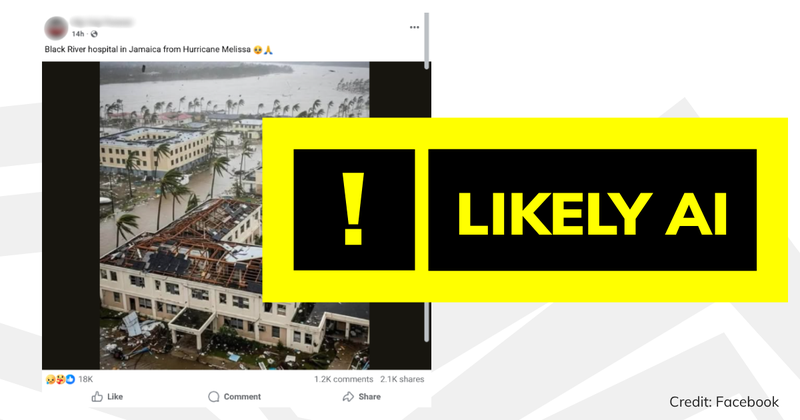Developer Offer
Try ImaginePro API with 50 Free Credits
Build and ship AI-powered visuals with Midjourney, Flux, and more — free credits refresh every month.
AI Generated Hurricane Hoax Debunked
The Viral Claim: A Hospital in Ruins
An image has been making the rounds on social media, shared across platforms like Facebook, Instagram, and X, with a startling claim. It purports to show the Black River Hospital in Jamaica, its roof torn away and structure devastated, in the aftermath of Hurricane Melissa. However, a closer look reveals that this dramatic scene isn't real.

Unmasking the Deception with AI Detection
Analysis by fact-checkers quickly exposed the image as a fabrication, most likely created using artificial intelligence. A simple Google reverse image search flagged the picture as having been “made with Google AI”.
A spokesperson from Google later confirmed this, stating that the image contains a SynthID watermark. SynthID is a sophisticated digital watermark embedded into content produced by several of Google's AI tools. It is invisible to the human eye but remains detectable even if the image is resized or its quality is altered. This technology is a key tool in identifying AI-generated or modified content.
While Google's tools can confirm that AI was used to “generate or modify” the image, the exact extent of its use is not always clear. This isn't the first time such watermarks have helped identify misinformation, with previous instances including fake images of LA fires and the aftermath of an earthquake in Afghanistan.
Comparing Fiction with Reality
Beyond the digital watermark, there is no other evidence to suggest the image of the destroyed hospital is authentic. While it is true that Hurricane Melissa did cause damage to the actual Black River Hospital, satellite imagery of the real location reveals a building layout and surrounding geography that do not match what is shown in the viral picture. The hurricane reportedly made landfall in southwestern Jamaica on Tuesday, October 28.
Tracing the Source of the Fake Image
The earliest discoverable version of the fake image was traced back to a Facebook account whose biography explicitly states: “Real disasters. AI visuals”. This provides a strong indication that the image was created and shared with the knowledge that it was not authentic.
How to Protect Yourself from Misinformation
This incident is a powerful reminder to be critical of content encountered on social media. Before sharing a shocking image or story, take a moment to question its authenticity and the reliability of its source. To help navigate this increasingly complex digital landscape, you can use guides on how to spot AI-generated content and protect yourself from spreading misinformation.
Compare Plans & Pricing
Find the plan that matches your workload and unlock full access to ImaginePro.
| Plan | Price | Highlights |
|---|---|---|
| Standard | $8 / month |
|
| Premium | $20 / month |
|
Need custom terms? Talk to us to tailor credits, rate limits, or deployment options.
View All Pricing Details

